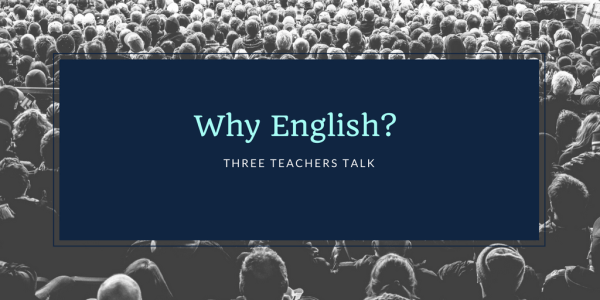
I’ve had a weird year. Many of us have. For me, it has been kind of like a tornado blew my house off to Ontario but left the foundation behind. What do you do in a situation like that? You might first bask in memories and drive to the river to wave hello to your old house sitting in a field somewhere south of Sarnia. (Hello from Michigan!) But after a minute, you can’t keep shouting at your house telling it how much you miss it. No, eventually you go back and examine the foundation that’s still there.
We go to work and deal with one-size-fits-all state mandates. We check the education news and see grant after grant going to STEM courses. We go out with friends  and hear a hundred citations to or shouts about “fake news.” But what’s the foundation that holds strong through all of this?
and hear a hundred citations to or shouts about “fake news.” But what’s the foundation that holds strong through all of this?
As my main man Hamlet would say, “Words, words, words.” (Granted, he was in a different context when he said that, but then again, maybe not that different.) In the craziness of 2017, I keep thinking about thinking. I keep returning to the humanities. I keep coming back to English. Why English? Why humanities? Why liberal arts?
We might as well ask, why words? So let’s.
Why words? Why do we take and teach English classes in the first place? In the news media and conventional wisdom of the day, business leads the way. For so many of our students, making a million dollars is their goal and only sign of success. Ours is a society that does measure success with bank account commas, so that’s entirely understandable. But if you read interviews with wealthy thought leaders (say, the Bill Gates of the world) or look at a survey of CEOs, you see that they want to hire creative thinkers and collaborators. They want liberal arts majors. They want folks who are good with words. Why? Words are how we show thinking. We need thinkers.
Our work as English teachers is cut out for us and is more important–and harder–than perhaps ever before. Words build a mind. Words build a soul. Words build a sense of self in community. They build the community. Regardless of our students’ career goals, if they are to be successful and thoughtful human beings, they need the opportunities to think, to listen, to communicate, to write, and to speak that English classes can provide in ways that no other discipline can.
Sure, students read in science class but mostly with a goal of learning the difference between xylem and phloem. Yes, students write in history class but mostly with a goal of explaining the cause of—all too often—a war. English class allows the unique opportunity to read, write, and speak with a goal of greater understanding. Our goal boils down to a greater ability to think.
But that’s hard to do. Many people want a checklist approach to teaching English, but that’s not how literacy works in a real world democracy. We have to read information in live time, and we have to decode big ideas on the fly. This doesn’t happen when students can use only textbooks. We need to be okay with having hard conversations and using real-world texts, but how do we foster safe spaces for these discussions? By doing it. We can model for students by actually engaging in deep discussions in our lives and in our classrooms.
English teachers have rare opportunities to get to the deep, real work of an education. (No pressure, eh Teach?) The English department is often the home of the faculty’s most outspoken and deepest thinkers. This is no mistake because the very material we teach increases critical thinking and empathy. English teaches us to read deeply, to pause and think critically, and to empathize. If we embrace this role as teachers, we can help students change the face of America and the future. We need understanding. We need kindness. We need a viable, sustainable society. That is why English classes matter. That is why we study words. We need humanities because we need each other.
Mitchell Nobis (@MitchNobis) is the president of the Michigan Council of Teachers of English, a co-director of Red Cedar Writing Project, and a curriculum support teacher in Metro Detroit with over 20 years experience in the high-school English classroom. He recently co-authored Real Writing: Modernizing the Old School Essay, from Rowman & Littlefield, and for June 2017, he’s posting a poem per day at the Tupelo Press 30/30 Project website.


[…] teachers have rare opportunities to get to the deep, real work of an education,” Mitch Nobis writes. Yes, we […]
LikeLike
Mitch!! Thank you for this timely and beautiful argument for the humanities. I will read this piece with my students as we begin our deep study of the power of language and why it matters. I hope they sink their teeth in the message.
Now, I am off to buy your book!
Blessings to you for a great school year. Thank you for writing with us. Please do so again.
LikeLike
I’m a teacher from Russia. We have the same problems. It’s difficult to struggle with the Internet and mass media. But every day we try to do our best to teach our students kindness, a good language and the history of our country.
LikeLike
Great 💭
LikeLiked by 1 person